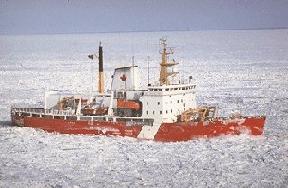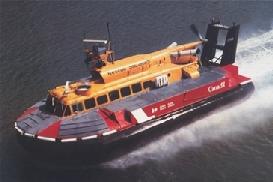"Leading the way in marine safety, service, and protection of the
marine environment."
|
Coast Guard Activities
The Canadian Coast Guard (CCG) undertakes programs and activities to achieve its long term objectives and, as a result, contribute to one or more of the Department of Fisheries and Oceans' (DFO) Business Lines. In the case of the Coast Guard, these programs can be viewed as its major service lines and include the following:
- Marine Navigation Systems
- provides, operates and maintains a system of aids to navigation; and
waterways development and maintenance, as well as ensuring protection
of the public right to navigation and protection of the environment.
- Marine Communications and Traffic Services
- provides distress & safety communications and co-ordination, vessel
screening to prevent the entry of unsafe vessels into Canadian waters,
regulation of vessel traffic movements, and management of an
integrated marine information system and public correspondence
service.
- Icebreaking

- provides route assistance for vessels operating in ice-infested
waters, ice routing information, support to harbours and facilities,
and flood control services.
- Rescue, Safety and Environmental Response
- provides marine search and rescue and emergency preparedness
capabilities; promotes boating safety to the marine public; and
responds to pollution incidents from shipping through oversight of
private-sector cleanup, or in certain cases direct spill response
management.
- Technical and Operational Services
- provide engineering, technical, and operational services to program
branches and the operators in the regions for CCG ships, systems and
CCG sector specific facilities.
Coast Guard Clients
The clients of the CCG are well defined and include the following:
- the Canadian public, which expects the provision of preventative
measures to minimize the possibility of marine pollution, and an
emergency response capacity to deal with environmental issues of
local, regional, national and international concern. It depends on the
federal government to play a lead role in ensuring that appropriate
measures are taken to prevent and reduce the adverse effect of
pollution incidents on the marine environment. All Canadians also
require assurance of marine systems that provide for the safety of all
types of marine activity, and an effective search and rescue
capability;

- the fishing industry, which expects reliable distress and safety
communications, efficient navigation systems and an effective
communications network. Increasing emphasis is also being placed by
this group on the importance of the CCG's environmental protection
mandate. Marine pollution, particularly from large source spills, can
have a devastating impact on their ability to earn a living;
- the marine commerce sector, for example, commercial shipping, ferry
traffic, the cruise industry, etc. Services provided by the government
in support of marine transportation remain an essential element in
maintaining Canada's competitive position in overseas markets. Users
expect to have a fair and meaningful say in the levels of services
provided, and to play a contributory role in determining how costs
will be levied for such services. Stakeholders expect reliable
distress and safety communications, efficient navigation systems,
icebreakers to provide access to icebound Canadian ports, timely ice
routing, integrated marine traffic information services and a
competent communications network. Equally important are the services
provided by the Coast Guard as a part of the basic marine safety
system which allows all vessels to use Canada's waters safely;
- the recreational boating sector, which, as an important and specific
element of the Canadian marine population, expects emergency response
to threats to safety and the environment and similar services to those
required by marine commercial clients with respect to aids to
navigation and marine communications and traffic services, including
the distress and safety services. Like stakeholders in the marine
commercial sector, recreational boating clients want a fair and
meaningful say in the levels of services provided and the use of any
revenues generated, especially in the areas of boating safety
awareness and Search and Rescue (SAR) prevention promotion;
- DFO programs (Fisheries Management, Science etc.), which expect cost
efficient and appropriate fleet services and pertinent, reliable
marine traffic information to assist in the delivery of their program
plans;
- other government programs which expect efficient and appropriate fleet services which are cost effective and meet their requirements. Activities include conducting oceans based research, fisheries enforcement, RCMP (drug interdiction) etc. Furthermore these programs rely heavily on marine traffic information disseminated by marine communications and traffic services in support of their respective activities.
- international marine community which expects continued leadership from Canada in the areas of environmental assessment, SAR and marine communications and traffic services.
CCG Fleet
| Heavy Gulf Icebreakers | 3 |
| Medium Gulf - River Icebreaker
| 4 |
| Light Icebreaker - Major Navaids Tender
| 9 |
| Light Icebreaker - Medium Navaids Tender
| 2 |
| Ice Strengthened - Medium Navaids Tender | 6 |
| Offshore Research & Survey | 7 |
| Coastal Research & Survey
| 4 |
| Inshore Research & Survey
| 1 |
| Small Navaids Tender
| 10 |
| Special River Navaids Tender
| 4 |
| Offshore Multi Tasked Patrol Vessel
| 1 |
| Offshore Ice Strengethened Multi Task Cutter
| 4 |
| Inshore Fisheries Research
| 8 |
| Intermediate Multi Task (Patrol) Cutter
| 6 |
| Small Multi Task Ice Strengethened Cutter | 2 |
| Small Multi Task Cutter | 14 |
| Multi Task Lifeboat | 9 |
| Multi Task High Endurance Lifeboat | 10 |
| Multi Task Medium Endurance Lifeboat | 2 |
| Insure Multi Task Patrol Vessel
| 11 |
| Multi Hulled Survey & Sounding | 3 |
| Small Multi Task Utility Craft
| 10 |
| Air Cushion Vehicle
| 5 |
| College Training Vessel
| 3 |
SOURCE: Canadian Coast Guard.
|




